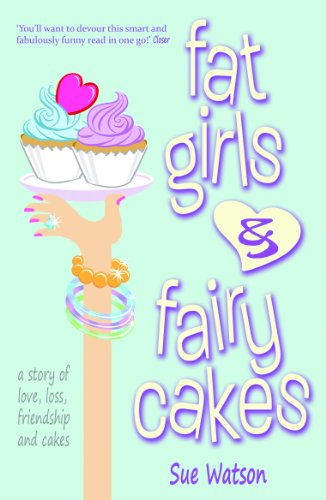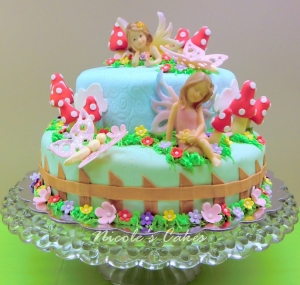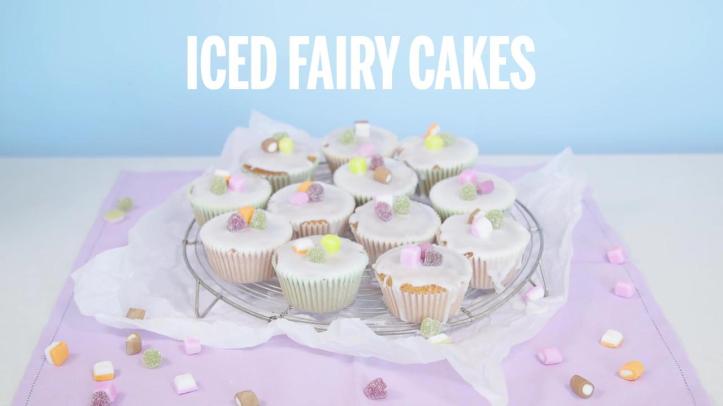The following book has been selected as part of my search to find positive representations of folks who identify as fat women in fiction, nonfiction, or poetry. That positive representation will not hinge on the character being miserable and then happy after losing weight or falling in love. Characters can lose weight or fall in love, but it is not the catalyst for their happiness. I also will not recommend books in which the character pulls her body apart (I call this the “chicken dinner”) and criticize pieces.
Thus, books will either meet or not meet my criteria, which will factor overall into my recommendations. I purposely use the word “fat” because it is not a bad word. Using plump, curvy, plus-sized, fluffy, big-boned, shapely, voluptuous, or any other term suggests that fat is bad and thus needs a euphemism.
Dear Ms. Sue Watson:
I’m writing to my followers about your 2011 book, Fat Girls and Fairy Cakes. Firstly, thanks for using the word “fat.” Most people think it’s a bad word, but I have a whole webpage devoted to finding fat women in books. So, thanks for that! Also, I didn’t know “fairy cakes” was British for “cupcake.” I think.
For me, reading a book with such a saccharine title is a risk, risky because I’ll likely guess everything that happens before it does and start skimming the pages to confirm my suspicions. I mean, look at the cover!

You surprised me, though, Ms. Watson. Not once did I guess which direction the book would go. Well, the main character had to make cake eventually, but I was surprised that she started as a TV producer. Other than that, you left clues that misdirected me, and I applaud you! I only thought people did such things in mystery novels, but these tactics prove effective in romances, too.

Because their lives weren’t spelled out from chapter one, I cared about your characters. Stella, your 40-something narrator, was quite vicious. I mean, she wanted some people dead! When her boss makes her angry, Stella goes all Full Metal Jacket in her head:
I would shoot her like a target at a fairground, hook a duck, hit a can, and win a teddy. And as her veins bulged and her malevolent orange lips slurped the calorie-free liquid, I slowly pulled that imaginary trigger and blew off Mary Jane Robinson’s head.
Shouldn’t this make me worried? I’m not so sure. I can imagine a suburban mom getting quite angry, especially when she’s having problems with her distant husband and nine-year-old daughter going through a goth phase. When things with the husband go down a dark and stormy road, Ms. Watson, you keep things realistic. Nothing gets cheesy, and I thought Stella handled the emotional Christmas scene beautifully (even if she does bludgeon someone with a turkey). After all, nasty people aren’t forgiven because there are presents and a tree.

Did you know you’re funny, Ms. Watson? It’s one of your best qualities. Surely, you’ve noticed how lacking your punctuation is (I’ve fixed all the quotes included; you’re welcome), but readers like me will forget such issues if we laugh. Things looked bleak when Stella’s boss transferred Stella to a different department to produce a show about gardens and religion. Stella assures us no one would watch such garbage, but she has to make a show anyway:
So there I was, in darkest Rochdale, up to my neck in compost and Christ, reluctantly producing the department’s latest offering, now titled Is God in the Garden?, billed as “a seasonal exploration of the influence of God on and around nature against the backcloth of a church garden,” but which was rapidly becoming a “sex-fueled romp through the boggy English countryside” (with a few bulbs and a bit of Jesus).
Aren’t you a hoot!
But tell me, Ms. Watson. Do you hate your body? I’ve seen your author photo. Even though it looks like it’s a taken from a drone in the sky, I can see that you’re fat, just like me. So why, then, did you make Stella hate her body so desperately? And why do her friends confirm her feelings? Stella admits that if she loses weight she can squeeze into what is a size 8 in the United States. Do you know how small that is, Ms. Watson? It’s smaller than the average woman in my country. And to prove that Stella is fat, you have her constantly eating dessert. Constantly. But much like Bridget Jones, Stella has always just started a diet. When she starts consuming diet meals (fruity versions of Slim Fast), I couldn’t help but wish I were reading Dietland instead, in which an anti-diet spy would reach out to Stella and reintroduce her to actual food.
While your main character did not diet or date her way to happiness, I sure wish Stella and her friends had been kinder to themselves and each other. There was a lot of celebration over failed relationships that led to depression, which led to losing weight. There’s a lot of tummy tucking and chin hiding (exactly how does one hide one’s neck?). Here’s the odd thing, Ms. Watson: had you left all mentions of fat shaming out of your book, it wouldn’t have changed the plot or characters one ounce. Not one. So, if you’re going to write fat characters in the future, here’s some advice: 1) actually make them fat, 2) let them eat all food, not just dessert and diet food, 3) create friends who don’t humiliate your fat character, or better yet, write some friends of various sizes.
You were so close, Ms. Watson. So close!
Sincerely,
Grab the Lapels
p.s. I ended up trying to bake my own fairy cakes! Check out Parts 2 and 3 of my baking adventure!

I like the way you approach the review here – I really do. And I know what you mean about Stella having (or developing, anyway) a sense of confidence in what she looks like. I’m glad that you found some things to like about the book, though.
LikeLike
Thanks. I don’t know why, but a letter felt right. I think because this book DID have so much potential, avoiding where many rom-com novels fail, that I wanted the review to feel more personal.
LikeLiked by 1 person
Fairy cakes as I know them are cupcakes with wings – 2 cupcake quarters on edge – set in whipped cream. Great review BTW.
LikeLike
Nooo, those are BUTTERFLY cakes! Well, they are here, in the deepest, darkest depths of the West Midlands, UK. Other cake names may differ …
LikeLike
Got a link to a picture of what you think fairy cakes are? The comments on this post are getting “heated.” 😀
LikeLike
OK, fairy cakes: https://www.bbcgoodfood.com/recipes/415618/iced-fairy-cakes
butterfly cakes: https://www.bbcgoodfood.com/recipes/1580660/simple-butterfly-cakes
LikeLike
Compared to American cake, there is almost NO frosting on those! 😂
LikeLike
I have never seen such a thing and am now Googling. *comes back from Googling* Okay, according to the internet, you guys have fairy BREAD.
LikeLike
Every kids’ party has fairy bread – buttered white bread covered in hundreds and thousands.
LikeLike
Are the hundreds and thousands the same thing as sprinkles?
LikeLike
Yes.
LikeLike
Yes, fairy cakes are cupcakes, so funny there are two names for them. I loved this way of reviewing and what a shame because she did so well up to that point …
LikeLike
Thanks! A letter felt more personal, which I wanted because the content of the book was both excellent and cruel.
LikeLike
what a good way to do a review…. I never think of cupcakes and fairy cakes as being the same beasts. The former tend to have about twice as much sugary goo on the top as the latter….
LikeLike
Okay, please send a link of a photo of Welsh fairy cakes! Everyone is debating what they REALLY are 😀
LikeLike
I’ll have to do some digging to find these….
LikeLike
well here is one photo that might give you an idea. they are smaller and flatter….http://www.goodtoknow.co.uk/recipes/mary-berry-s-iced-fairy-cakes
LikeLike
Mary Berry! 😀 These are flatter and smaller, though I admit the icing looks way more enticing that American frosting.
LikeLike
That’s the thing I detest (strong word I know but it’s appropriate here) about cup cakes. Some of them here have more frosting than cake. And apparently there is a trend to have a giant cup cake instead of the traditional wedding cake. Yuk
LikeLiked by 1 person
Agreed! Plus the sponge in fairy cakes tends to be much lighter – like Victoria sponge.
LikeLike
I want pictures, everyone, even one from online! I’m going to make a fairy cake collage post! 😀
LikeLiked by 1 person
Sadly all the people who’ve posted pictures have decorated them so much I can’t find any pics that look like the simple fairy cakes we used to eat when our Mums all baked them…
LikeLike
I searched “old fashioned fairy cake” and going this, for example: https://goo.gl/images/iKpkFy
LikeLiked by 1 person
Hmm… shouldn’t have the tops cut off and should have icing on them…
I can’t work out how to add an image but here’s a link to a page with various pics. The chocolate iced ones and the ones with cherries on top are what I think of as proper fairy cakes – though the cherry is a bit decadent for my Glaswegian childhood… 😉
https://modernhousewifery.wordpress.com/tag/fairy-cakes/
LikeLike
Nice! I need to make a big fairy cake post now!
LikeLiked by 1 person
oh yes that’s true though my victoria sponges are often not as light as I’d like
LikeLiked by 1 person
What is a Victoria sponge?
LikeLike
It’s THE classic sponge cake. Made in two layers and then sandwiched together – the traditional way is just wth strawberry jam but some people use cream. Then the top has a sprinkle of sugar.
LikeLike
Ohhhh, I HAVE seen those in The Great British Baking Show.
LikeLike
This whole conversation makes me SUPER hungry!
LikeLiked by 1 person
😂 🎂
LikeLiked by 1 person
Well I think your picture of fairy cakes is accurate, though I must say the addition of the little jujubes on top seems excessive. Fairy cakes should be small and light with just a thin layer of icing (frosting) sometimes coloured or flavoured – like chocolate. Yum!
The punctuation would kill it for me however much it made me laugh…
LikeLike
A lack of punctuation makes it harder to read (that’s why we have it, of course), but I think I’m practiced thanks to grading all those composition papers…
LikeLiked by 1 person
😂
LikeLike
[…] give Melanie @ Grab the Lapels 100% credit for helping me realize a list of unacceptable excuses should be explored. I’m not […]
LikeLike
I love the format of this review! There are many times I’ve considered writing in this format, only to stop myself because I didn’t think anyone would like the format. I consider myself proven incorrect!
I’m sad that this book didn’t have great fat representation. 😦 But the book, aside from that, seems to be pretty worthwhile. The question is: Do you think that the reader can get something valuable out of this book despite the poor representation? Is this the sort of book you’d want to prep someone for ahead of time, warn them of the poor representation before you had them read it? I worry about this sometimes– people might not recognize this as poor representation… you know?
LikeLike
I think people read about women dieting and see it as normal because, in a way, it is. Honestly, if I had a paperback version, I would take a sharpie and cross out the diet stuff. The book wouldn’t change in plot or major characterization. Maybe I should gift the book that way, lol. I think I would warn readers (and I do on my fat reading goals page). I try to remember my objective but not throw the baby out with the bathwater.
I wonder if I wrote a letter because I had just read Dear Fahrenheit 451!
LikeLiked by 1 person
Haha– I’d love to read your Sharpied-out version. My sister once took a red pen to Twilight. She stopped reading when she ran out of ink. XD You should *definitely* gift the book that way.
LikeLike
Ooooh, those annoying White Elephant Christmas gifts are always a great opportunity to support a bookstore and annoy a relative with “homework.” 😀
LikeLiked by 1 person
!! That’s absolutely brilliant. I would love to pick up a manually edited copy of a book in a white elephant! XD
LikeLike
I really love this review! I would have assumed the same thing about the book as you, based on the cover. I’m glad to hear it was a pretty good book – you’ve even tempted me – except for the fat shaming and dieting. But I can’t say that I’m surprised.
I think in “Mile End” she eats pretty normal food. In fact, at times I was worried about her because she didn’t seem to be eating enough! But she drank a lot of coffee and a lot of wine.
LikeLike
Oof, and coffee makes you feel full, while wine has enough sugar to make you not hungry. I’d say give it a try. It’s pretty cheap on Amazon.
LikeLiked by 1 person
I landed here from your fairy cakes experiment. Now you have me thinking of books that featured fat women. The Thin Woman by Dorothy Cannell (which I remember being very funny though it might not meet your criteria for body positivity; I’m not sure as it’s been a while since I read it) and Terry McMillan’s Waiting to Exhale in which one of the characters struggles with weight (I guess the struggle part of her storyline would be a disqualifier but I remember her sisterhood of close friends being very affirming). When I think about it, books where a fat woman’s size is not a problem just a part of her are rare. Hmmm. Off the top, only Alexander McCall Smith’s #1 Lady’s Detective Agency comes to mind (I remember her weight being just a matter of fact and her being self-assured). I, too, liked your approach to the review (and the tone of your blog generally). Appreciate you pressing on with the review in spite of your issues with the book. The punctuation issue may have been my line though as I find that very distracting (nobody’s perfect but good punctuation and grammar are minimums for me so that I can focus on the story). Do you have a favourite so far re fat girl books?
LikeLike
A few people have recommended Alexander McCall Smith’s books for my quest, but things are made doubly hard because I only review book by individuals who identify as women at Grab the Lapels! My favorite so far is Dietland by Sarai Walker. It was so very good, and I’m going to have to re-read it as soon as possible.
LikeLike
Cool.
LikeLike
[…] you haven’t read Parts 1 and 2 yet, I recommend you go back and […]
LikeLike
[…] that no one seems to agree on what a fairy cake is. In the comment section of my book review of Fat Girls and Fairy Cakes by Sue Watson, my readers across the globe tried to tell me what fairy cakes really are. Remember, […]
LikeLike
[…] give Melanie @ Grab the Lapels 100% credit for helping me realize a list of unacceptable excuses should be explored. I’m not […]
LikeLike
[…] give Melanie @ Grab the Lapels 100% credit for helping me realize a list of unacceptable excuses should be explored. I’m not […]
LikeLike